#Silm lore
Explore tagged Tumblr posts
Text
’Felagund’ traditionally means ‘badger’ from NoME typescript 1969
#finrod’s a hufflepuff confirmed#silmarillion#silm#silm shitpost#Silm crack#silm lore#tolkien#finrod#finrod felagund#tolkien linguistics
33 notes
·
View notes
Text
Introducing my newest Silm OC (he’s based in canon!)
For the sake of showing you his face, I created him in BG3 character creator.

Funny looking for an elf, isn’t he? There’s a reason for his pallor.
So for those who aren’t familiar, in the first age, the Feanorians were horrifcally dead set on getting those Silmarils. A sweet guy named Dior - who was the fairest creature in the world, made up of elven blood, human blood and the essence of the maiar - ruled Doriath after Thingol. He had three children with Nimloth of Doriath: Elwing (Elrond’s mother), and two twin boys; Eluréd and Elurín.
During the Second Kinslaying (in which the Feanorians sieged Doriath for the silmaril previously possessed by Dior’s mother, Luthien), Dior and Nimloth were murdered, and Celegorm’s servants cruelly took the twin boys into the woods and left them there to starve and die. Maedhros later came back to look for them, but they were lost.
This is where the canon ends and the OC shenanigans begin:
One of those boys survived and ate the other after he succumbed to the elements.
The twin who survived fended for himself, feral, naked, and far away from civilisation. As he matured, his nightly torments attracted the attention of the Lady of Shadows, Sauron’s messenger, Thuringwethil, the vampire.
She watched him from a distance and slowly seduced him, before squirrelling him away to Tol Sirion - Tol-in-Gaurhoth / The Isle of Werewolves, where she subsequently sired him, possessive of him and keeping him a well-guarded secret, longing for the company of another vampire. It was his memories of cannibalism that drew her attention, and it was through those memories that she seduced him, expressing that she knew he had tasted the flesh of his kin at a young age, and that there was nothing to be ashamed of.
Thuringwethil, however, was not completely heartless, and sensing that Anlanchon (as he was named, for his nudity) was unhappy in Tol-in-Gaurhoth, she unleashed him upon the world.
When the Third Kinslaying came about, he took out his vengeance on the servants of Celegorm and the other Feanorians, killing as many of them as he could before the break of dawn. His primary target, however (Maedhros, whom he feared), was already far away, and with the help of Maglor, seized his sister, Elwing’s, children after she was felled - Elrond and Elros, whom Maglor then raised as his own.
He is Elrond’s grumpy vampiric uncle, and looks more like Dior and Beren than Luthien, Nimloth and Elwing. He chose to live as an elf rather than a human.
Due to his change of name and the fact that he fled East towards the Greenwood to live as a Silvan elf, not many people are aware of his lineage. What could possibly give him away, though, is the fact that he is still in possession of his chain bearing the symbol of Doriath.
A royal mystery. There were even headstones and statues erected to mark the passing of Elúred and Elurín. Nobody knows he exists.
Despite being ‘naked’ in his demeanour (and sometimes physically, despising the texture of clothing), he fits in relatively well with the Silvan elves and goes completely undetected. He’s deemed ‘eccentric’ or a ‘bit odd’ at most. To blend in further, he even smears his hair, eyebrows and eyelashes with natural brownish-red dye to offset the red of his eyes and make them appear more brown, so he simply looks like a brunette with brown eyes, with a slightly sickly pallor, which gains him the kind-of privileges and both the upsides and downsides of someone who is chronically ill.
He’s infiltrated Thranduil’s court (having followed him, knowing Oropher as a loose acquaintance), and is very subtle and passes easily under the radar, just going about his business and duties in the dark comfort of the halls, his work never requiring him to step outside into the sun… and he only picks off those who won’t be missed. He hasn’t sought a position of power or attention (such as advisor or head of anything); he’s just a lowly servant.
He doesn’t like those of feanorian descent, and from Thuringwethil’s accounts, he also doesn’t like Sauron or his affiliations. There are very few people he actually likes (Elrond, Elladan, Elrohir and Arwen being a few of them, of course; he sometimes uses magic to ‘check in’ on them every so often). He’s appeared to Arwen and Aragorn a few times to help them whilst in disguise (he shouldn’t have favourites, but he does because they remind him of his grandparents, Beren and Luthien).
(I headcanon that he gave Arwen his chain, and told her to keep it hidden, keep it safe, and to use it to “find him” if she was ever in trouble. Elrond has never seen the chain, but if he did, he would recognise the seal and immediately become suspicious.)
Some inspiration I’ve taken for his character:
- Richard III and the Princes in the Tower
- Prince Aegon Targaryen/Blackfyre
- Jaqen H’Ghar, the Faceless Man
#silmarillion#silm#the silm#the silmarillion#lotr#lotr oc#silmarillion oc#silm headcanons#the second kinslaying#silm lore#silmarillion fandom#the silm fandom#silm fic
10 notes
·
View notes
Text
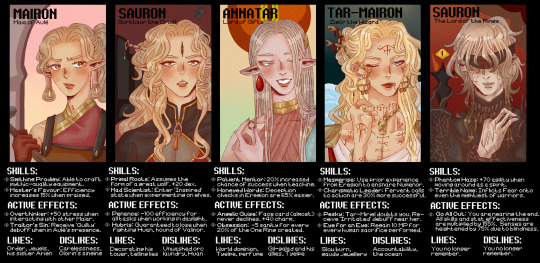
started off as me redrawing some of my initial mairon designs and ended up going on an rpg tangent 😭 i really wish i could have done the portraits in a pixel art style to better fit the aesthetic but my canvas wasnt the right size!!! i ended up changing annatar completely (im still contemplating how much i prefer this one compared to his old one however...!) and adjusting post-numenor sauron a bit when compared to their old 2022 sketches! im probably gonna do more redraws in the months to come cause of all the stuff i wanna change when i look back to some of my old designs haha 😳
bonus: void delusions (nebula background designed by Freepik)

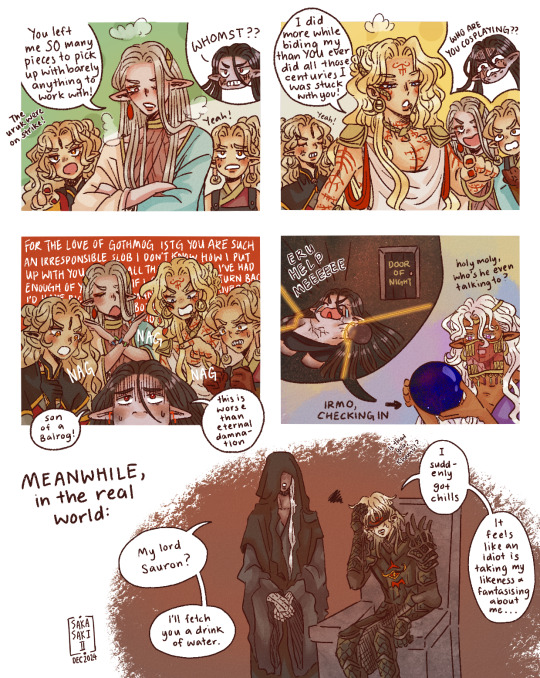
i like to think each 'form' sauron takes eventually has different mannerisms and likes/dislikes the longer he stays in them without shapeshifting into something else, but one thing they all have in common is being predisposed to nagging melkor 😎
#silmarillion#mairon#sauron#annatar#tar mairon#melkor#silm#maybe i had a little too much fun with the rpg stuff.... ONE DAY... one day i will learn to program....!#i like to think his go-to look is the blonde one from when he was in the mairon and sauron-gorthaur era#which is why tar-mairon looks so similar to those two eras hehe#i wanna try and make annatar a bit more distinct from them next time....#anyways im in a bit of a lotr nostalgia phase bc i saw war of the rohirrim and surprisingly i liked it!!#mostly because of hama.... he reminded me of maglor quite a bit 🥹#i was apprehensive going into it but ended up enjoying it haha... tho its prob bc i dont know any of the 3rd age rohan lore#i should probably brush up on everything else that doesnt concern the elves...!! forgive my ignorance professor tolkien#the silmarillion#silm art#third age#second age#silmart#morgoth#khamul#nazgul#irmo#maiar#valar#lotr#tolkien fanart
260 notes
·
View notes
Text
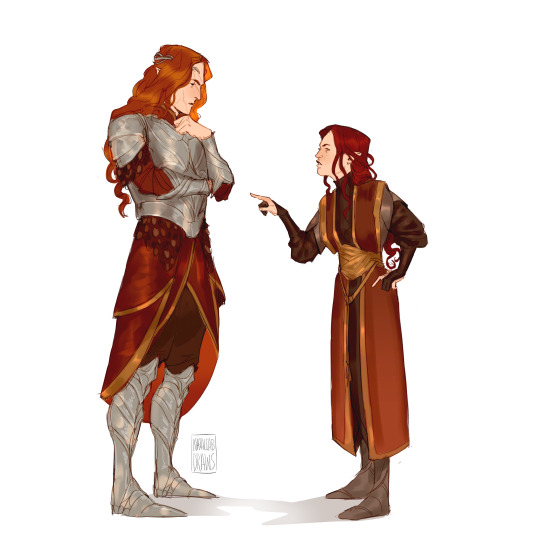
imagine you're Maedhros, you're at least thousand years old, have survived (and took part in) several kinslayings, survived the Horrors™ and are trying to recruit a reclusive elven people to join your fight only to end up being violently humbled by said elven people's princess who happens the elven equivalent of a 13 year old at the time.
anyway i was thinking about the one time Narien meets Maedhros while he was still alive and how much of a menace she was about it (she absolutely had a crush on him but you'd have to pry that info from her cold dead hands). i did write a short story about their meeting but idk if it will ever see the light of day
#*in john mulaney's voice* 13-year-olds are the meanest people in the world#bending lore to my will#maglor is somewhere in the background trying not to loose his shit bc how did they find maedhros 2.0#the silmarillion#silmarillion oc#silm#silm art#elven oc#maedhros#maitimo#lotr oc#tolkiens elves#digital art#fanart#art#elves#original character#oc art#i feel like there is a joke here about two red haired heirs to their family doomed to fail#also thinking about how Narien tragically ends up following in his footsteps in a way
323 notes
·
View notes
Text
@dalliansss @skaelds are these three with Miriel before Fëanor? Or….does Indis just have a litter?
The last three I only found out about a few days ago sooooo...
Reblogs would be greatly appreciated!!
91 notes
·
View notes
Text

It was snowy today, so I spent the day making watercolor art of the Silmarillion. Here's Beren, Luthien, and Huan the Hound going after the Silmaril💎
#I did this off the top of my head so if any part of it isn't lore accurate you can speak to my lawyer#lotr#tolkien#lord of the rings#silm#silmarillion#silm art#its been so long since i posted my art on tumblr#luthien#Beren#beren and luthien#huan the hound#watercolor
194 notes
·
View notes
Text

King Oropher with prince Thranduil comissioned by @pastelsugar6w6 Thank you so much for your trust and patience !
Comissions open !
10$-ONE character CHEST UP with color( every fandom, oc’s, etc)
15$ ONE character WAIST UP with color
20$ TWO characters CHEST UP with color( every fandom, oc’s, etc)
30$ TWO characters WAIST UP with COLOR
35$-ONE character FULL BODY WITH COLOR
50$-TWO characters FULL BODY with COLOR
60$-i don’t want put the word with nsxx or i will be flagged lol + COLOR + FULL BODY
i don’t do, mechas,background or armors too complicated
*only paypal
#thranduil#jrr tolkien#silmarillion#comissions open#comissions#tolkien#comission#thranduil oropherion#oropher#king oropher#elvenking#elves#sindarin elves#sindarin#elven prince#mirkwood#lotr#the hobbit#unfinished tales#tolkien universe#tolkien lore#books#movies#silm#the silm fandom#queue
167 notes
·
View notes
Text
Sauron, Galadriel, & Tolkien's Theology of Repentance - Part One

Summary: Character meta analysis on Sauron (and Galadriel, through the lens of Sauron). Based on both Silmarillion & RoP canon. 3.5k words. Discussion of Catholic theology involved. Blanket TW for discussion of violence, manipulation, etc., because Sauron. Spoilers for S1 & S2 and the Silmarillion, of course. The tragedy of Sauron is that he gets offered so many legitimate chances at redemption and forgiveness, and he denies them every single time. But we know he wants absolution, because that’s what he sees Galadriel as: his chance to bind himself back to the light, to be Mairon again, to heal the pain that he caused and that was caused to him under Morgoth. But because he has such a warped view of himself and his actions, he dismisses genuine extensions of compassion, forgiveness, and care as simultaneously beneath him and too good for him. And yet, he still pursues redemption, but through none of the channels offered to him.

In The Rings of Power, he’s given the explicit instruction to change for the good in the village after he’s reborn. He’s given the chance leave his past behind and work meaningfully in Númenor. He’s given the chance to redeem himself by Galadriel's offer of friendship (or love, depending on your interpretation). In the Silmarillion, he's even given the chance by Eönwë himself, and comes close to leaving Morgoth behind completely!
Let's look at this passage from Of the Rings of Power and the Third Age (emphasis mine):
When Thangorodrim was broken and Morgoth overthrown, Sauron put on his fair hue again and did obeisance to Eönwë the herald of Manwë, and abjured all his evil deeds. And some hold that this was not at first falsely done, but that Sauron in truth repented, if only out of fear, being dismayed by the fall of Morgoth and the great wrath of the Lords of the West. But it was not in the power of Eönwë to pardon those of his own order, and he commanded Sauron to return to Aman and there receive the judgement of Manwë. Then Sauron was ashamed, and he was unwilling to return in humiliation to receive from the Valar a sentence, it might be, of long servitude in proof of his good faith; for under Morgoth his power had been great. Therefore when Eönwë departed he hid himself in Middle-earth; and he fell back into evil, for the bonds that Morgoth had laid upon him were very strong.
This passage is clear that Eönwë is willing to pardon Sauron--he simply did not posses the power to do so. But when Sauron was told he must appeal directly Manwë, he gave up entirely and skulked back to Middle-earth. There are a few ways to read this:
1. He was not wholly repentant
Sauron simply wanted the protection of a new master in the absence of Melkor. i.e., he was rather fickle and simply wanted to be on whatever the "winning" side was. This is supported by the text literally saying that at least some of his obeisance was completely false, and that he only made a point of feeling bad about anything once his master had been chucked into the Void and his armies and strongholds were being destroyed (Thangorodrim). In this reading, perhaps Eönwë saw Sauron's treachery and referred him to Manwë knowing that it would be a test of his true intent. However, while a valid interpretation, I believe this to be the less holistic of the two.
2. He was truly repentant
Sauron did truly feel badly and "abjured all his evil deeds," but he was unwilling/unable to humble himself after being so fundamentally broken by Melkor and developing an insatiable power lust (hey, he isn't defined in the narrative by lust and pride for nothing).
Earlier in this same chapter, Tolkien wrote that Sauron could "...deceive all but the most wary." This is in the specific context of his physical shapeshifting. But, I would argue that this can also be tied to his lies. Tolkien has a specific ethic of beauty, where physical perfection is equated with moral goodness. Sauron completely inverts what is otherwise a hard and fast rule within Tolkien's writings by being the character most frequently described as "fair"--seven times to Lúthien's six, and she was the most beautiful woman to have ever lived!
(Side note: I have another post on Tolkien & beauty in the works where I'll get more into this idea)
Why does this matter? Even though this interaction with Eönwë takes place in the First Age, Sauron could at this point be in the demonic form Mirdania describes in the forge. And, I am inclined to believe that Eönwë, as the head Maiar and herald of Manwë, would be a pretty wary guy, and thus able to sense any of Sauron's trickery. I read this to mean that Eönwë looked at Sauron and saw his potential to be Mairon again, either in absence of his evil form or in spite of it.

Because Sauron is incredibly beautiful. And even if it is a disguise of the true, depreciated form of his spiritual essence, he presented himself to Eönwë at his most beautiful. He wanted, even in his act of repentance, to make himself more favorable in Eönwë's eyes. To show up as Mairon (who was likely close friends with Eönwë before everything went down, since they are considered to be two of the most powerful Maia and would have worked closely together).
But I don't think this was all manipulation on Sauron's end. I agree with the scholars mentioned in the text who believed that Sauron was truly repentant--which is why Eönwë even bothered referring him to Manwë instead of kicking him into the Void with Melkor.
And this is the tragedy: Sauron is told exactly how to repent, and believes fundamentally that it is an impossible path for him. And yet, he still longs so intrinsically for it! He was, under Aulë, a Maia of precision, perfection, and order. Under Morgoth, he feels disordered, dis-regulated. He needs to correct the fundamental imbalance within him, so why does he flee Eönwë?
It comes back to Sauron's pride.

If he follows through with this path of reconciliation, there is no way he can hide or pretend his actions away. If he cannot trick his fellow Maiar, he certainly cannot trick the Valar. And he cannot stand the idea of submitting himself back under their rule, especially now that he has tasted power. This is a pride wound; it is why the idea of confessing to Manwë would be humiliating to him as opposed to just upsetting/uncomfortable.
Again, the pivotal moment: he is told how to make amends for crimes and determines that he cannot do it. So he returns to Middle-earth and stews in his own self-hated and self-pity for a few years. In that time, he consciously or subconsciously latches onto Eönwë's offer--forgiveness from penance. It is the way forward. And if he cannot earn penance at Manwë's hand, he will do it on his own.
The Prodigal Son
This is where we have to talk about the Catholic roots of Tolkien's work for a moment. The scene where Sauron approaches Eönwë mirrors the biblical parable of the prodigal son. In this story, a man abandons his family, spends all his money, and falls into ruin. But when he recognizes his failings and returns to his father to get help, he is welcomed back into the family without question--in other words, he is forgiven and restored to his former position.
17 But when he [the prodigal son] came to himself he said, “How many of my father’s hired hands have bread enough and to spare, but here I am dying of hunger! 18 I will get up and go to my father, and I will say to him, ‘Father, I have sinned against heaven and before you; 19 I am no longer worthy to be called your son; treat me like one of your hired hands.’” 20 So he set off and went to his father. But while he was still far off, his father saw him and was filled with compassion; he ran and put his arms around him and kissed him. - Luke 15:11-32, NRSV CE (emphasis mine)
The parallel is clear; Mairon, the repentant Maia, returns home with hopes of reconciliation. He is prescribed the same task that the prodigal son offered to his father: he must be bound in servitude to his father/creator in order to pay off his debts. This is a deliberate allusion from Tolkien. The story of the prodigal son models the path of reconciliation that Eönwë describes. Tolkien seems to be drawing a line in the sand with this: Sauron is unwilling to do the work required by the Valar for repentance, so he is unable to receive the grace of a warm welcome back into the fold of the Ainur. Since he did not humble himself, he has to be told to do it. And he does not want to! He wants to be loved, but he also wants his power--evidence, in a way, of how his character was fundamentally altered in his time with Morgoth.

His pride--and his fear--cut him off from the potential of grace. He does not know for certain that Manwë would subject him to servitude (though I would argue that it's textually evident that it is a custom), but this assumption leads him to flee, which allows him to slip back into his old ways.
He wants to be Mairon (admirable) again, not Sauron (abhorrent). He wants to be accepted and loved, but not punished. He wants the benefits of reconciliation without the work he would have to do to earn it or the shame he would feel as he did. It's pride, but it's also deep shame--the flip side of his extreme ego is an implicit self-hatred, one that we can see in the subtext of how he speaks about himself and about his time with Morgoth.
Even the language Tolkien uses is heavily shame-coded, especially in a Catholic context; Mairon did not go willingly, he was "seduced." He admits to Celebrimbor that he was "tortured by a god". It becomes exceedingly clear through both text and on-screen canon that Sauron was routinely broken and abused for centuries. This has fundamentally damaged his self-perception, which is ultimately what leads him to "[fall] back into evil"--whether due to pride or shame, he hides, perhaps because he consciously or subconsciously does not believe that he deserves forgiveness, no matter how much he craves it.

Naked in the Garden
His flight back to Middle-earth after meeting Eönwë is reminiscent of another biblical scene, where Adam and Eve, after committing the first sin, hide from God in shame and fear (emphasis mine):
7 Then the eyes of both were opened, and they knew that they were naked...9 But the Lord God called to the man, and said to him, “Where are you?” 10 He said, “I heard the sound of you in the garden, and I was afraid, because I was naked; and I hid myself.” -Genesis 7-10, NRSV CE
The image of nakedness is, here, one of vulnerability, and Tolkien establishes that Sauron fears that which he cannot control. He needs the Rings under his power. He needs his armies and his enemies under his watchful eye. He is petrified of letting his power slip away (possibly due to never wanting to feel powerless in the hands of a Vala, fallen or not, again).
The biblical allusion here hearkens back to the fear Tolkien describes Sauron as feeling regarding his return to the Ainur. In the religious system Tolkien has established, which is likely inspired by his own religious beliefs, Sauron has sinned, and must make penance. But he is afraid of God/Manwë, and does not want to "let go" of his sin. In other words, he is not truly repentant. This reflects the Catholic sacrament of confession, which requires self-reflection and resolve to never commit the sin again.
Instead of shame driving him to contrition, it drives him to isolation.
But he still wants forgiveness. So, in his years of hiding in Middle-earth, he decides to earn it himself. His own way.

Enter the Rings.
Sauron wants to perfect the wrong he wreaked so that he can both earn his way back into the Ainur and keep his power. But what he does not realize is that this does not work. Eönwë is clear that he must forsake his true temptation--absolute power--through penance by submission. Yet Sauron in his pride thinks he can have it all. Sauron is a very carefully controlled villain, and the only times he snaps or makes significant mistakes are when his inflated self-perception is challenged, revealing the self-loathing and/or self-pity underneath. The best example of this is when he kills Celebrimbor prematurely, and cries afterwards. Why? Because Celebrimbor was right about him, and he hates it. He hates knowing that he is nothing more than the Morgoth's shadow, because Morgoth was his master as much as he was his tormentor. As Sauron puts it, his relationship with Morgoth was often defined by pain as a test to see "whose will was the mightier":
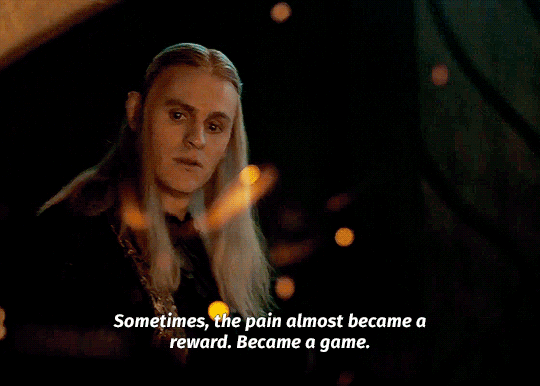
This image carries more shame, both in its implicit sexual connotations and in the simple power dynamic of it. Sauron, even though misguided, is rallying against Morgoth. He wants to break what Morgoth has created and build something new, something better, something apart from his old master entirely. But Celebrimbor confronts him with reality: he has not created something new, and perfect, and special, as he so wanted to--he can only act in imitation, not in generation. And when he got close with the Rings, it cost him everything. It's almost like he wants the power of a Vala, and loathes that he cannot attain it.
And this is why he becomes so singularly obsessed with Galadriel.

She’s his foil. They both crave power and adoration, but in the end of things, she does not fold under his temptation. She turns down everything she has ever wanted for the greater good and for the sake of her own soul. Sauron looks at Galadriel and perceives that she would have succeeded at Eönwë's test because she is willing and able to humble herself. This maddens him to the point of both desiring her and desiring to break her.
She learns that she is easily tempted and becomes strong enough to handle it (through a lot of tough love from Elrond & co.). She has to learn how to do it, but she is able to.
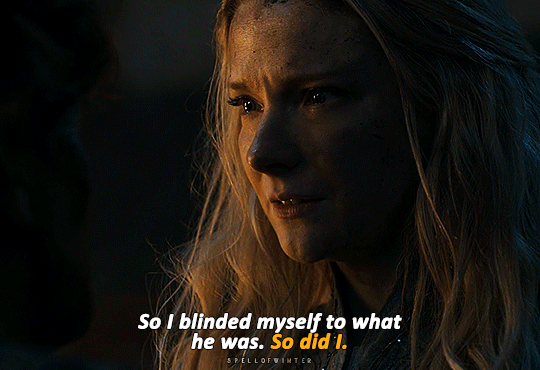

She grows from someone who resisted and rejected authority to someone who is trusted as an authority because of her ability to wield it wisely (see: Gil-galad allowing her to answer for him in 2x08).
In other words, she earns the trust, love, and support of her community. Sauron has to force his to comply—it is an illusion of love.
His possessive obsession with her also stems from her fairness. She was the object of her uncle Fëanor's obsessive desire for creation as well. Her hair was the inspiration of the Silmarils (see: The History of Galadriel and Celeborn; The Shibboleth of Fëanor - source with page #s here), which Morgoth desired more than anything to possess.
Sauron, wanting to spite his master, wants one better--to own that which inspired the Silmarils, to own the image of fairness (and thus of moral good) completely. This is why he wants to bind himself to her. This is why he needs her. He sees Galadriel as his mechanism of repentance, and his last triumph over Morgoth. Winning her is his salvation as much as it is proving that his will is the mightier. It is his way of dominating Morgoth. This starts, I think, as a genuine effort at proving himself to the Valar, but quickly consumes him entirely. He is overcome with the desire for revenge, just as Galadriel was at the beginning of the First Age.
And he sees this in her. Sees their similarities. Sees that she, too, is angry and lonely and so afraid of losing her power. And he leverages that to befriend her. This is where it gets ambiguous and you can read RoP as either painting the image of Sauron being earnest but completely misguided in his proposal, or you can see it as him being entirely manipulative.
I think the truth of that scene probably falls somewhere in the middle; just like when he presents himself to Eönwë, he is sincere in his desire, but only knows how to present it in an inherently contriving way. He does want to bind her to him, so he tries to only reveal to her the good aspect of that desire (and also of his desire for power, which he allows her to see because he believes that it is good and also because she understands it), and not the ugly underside of his internal struggle against Morgoth, the Valar, and himself.
And I do think, in his own way, he cared about her. Galadriel consistently shows kindness and compassion to him. In S1, they grow to know each other's minds and souls, and she considers him a close friend. He finds comfort in this, that someone could see the blackness of his heart and care for him anyway. He thought, in his isolation, that he lost that chance when he fled back to Middle-earth. And here is the very picture of the light itself telling him that she supports him, that she sees the good in him, that she wants to help him set the world to rights! Of course he is infatuated by this. Of course he also wants to use it. He is Sauron.
But Galadriel succeeds where he fails, so he stops playing nice and tries to forcibly drag her down with him. First, by baiting her with the image of the man she cared deeply for:

Then, by reminding her of all she is losing by rejecting him:

And she is still strong enough to say no. And not just to say no, but to shut the door completely. To look in the face of everything she has desired for centuries and turn it down, understanding that it will ruin her. Yes, she hesitates. Yes, she still wants it (wants him). But she wins the day by holding fast to the light that Sauron wishes so badly to bind himself to.
Because she has lost everything--her brother, her husband, the station as commander, the trust of her high king and best friend--and earns it back only through her resistance of her greatest temptation. It is a struggle, it is painful, it nearly kills her--but she does it. She wins the test that Sauron could not even bear to face.
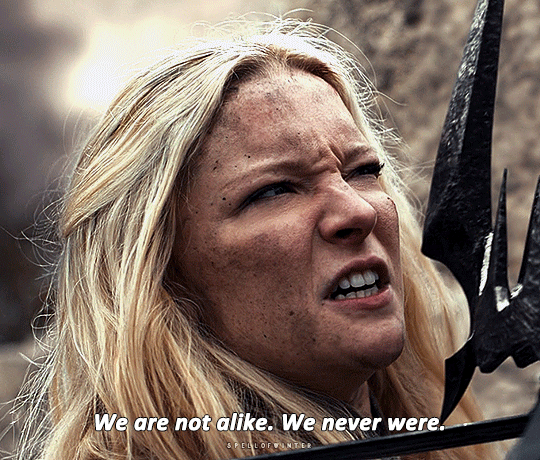
In their headlong, self-sacrificial tendencies, they are the same. Both view themselves as fundamentally stronger/better than their peers while also being deeply lonely due to their self-imposed isolation (Galadriel's laser-focused hunt for revenge, Sauron's exile in Middle-earth). But to Galadriel, the light is more important than her pride.
For Sauron, the light is his source of pride. He desires it more than anything, but condemns himself to never being able to touch it due to his rejection of Eönwë's offer. Paradoxically, he tries to grasp at it through Galadriel, the living silmaril, and succeeds only in darkening her. We learn from Gil-galad in 2x08 that his crown piercing her flesh in an act of brutal domination nearly strips her soul from her and pitches it into the unseen world. In this, Sauron is saying: If I cannot have you, I will force you to need me. I will break you into loving me.

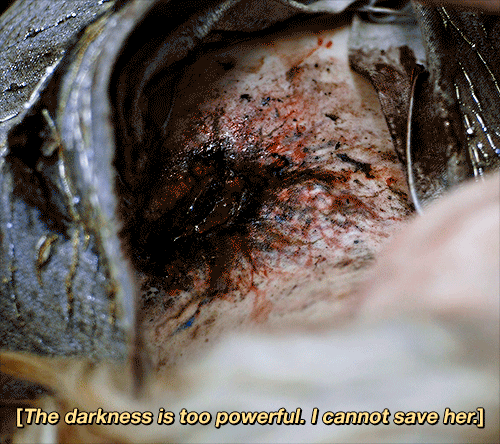
He says this to Celebrimbor as well. He no longer knows how to love properly. He only knows how to inflict pain until this object of his obessive desire needs him--just like how his immortal spirit was broken into submission by Morgoth. And isn't this revealing of his own sense of self? He refuses to suffer the path of light, but willingly suffers the maddening path of darkness because it is a comfortable, familiar suffering. One, he tells Celebrimbor, he even grew to enjoy (2x08). As the path of the Rings drive him madder and madder, his desire for the light (Galadriel) and the return of his power (Celebrimbor) become further disordered and corrupted until they culminate in him destroying them--and his chance at earning/owning them--entirely.

And this is Sauron's ultimate point of no return (which we will hopefully see in S3 🤞). The razing of Eregion and slaying of Celebrimbor were acts of petty rage he committed when his pride was injured. This was the final nail in the coffin. Galadriel, in her rejection of him, ruins what he sees as his true chance for redemption.
Galadriel, now stepping into the role of Eönwë, re-opens the invitation: "Heal yourself!" (2x08). But in rage and shame and stubborn pride, he turns it down again. I believe this is where his desire to heal Middle-earth shifts fundamentally into desire to dominate Middle-earth. He always wanted to rule, but now he wants to own.

#fae speaks#I spent hours pouring thru the Silm and RoP for this so if you enjoyed please let me know I'd love love love to talk about it more <33#sauron is my favorite freak in all of tolkien's lore rn I want to study him like a bug#btw this is saurondriel (and even silvergifting? if u squint) positive but with loads of nuance. i see haladriel as love and saurondriel as#possession. both are fun in fiction of course but I want to acknowledge how deeply messed up the dynamic is#but also! it's fiction! do whatever you want with it! if you want saurondriel to get a happy ending then do it <3#and send me the fic so i can read it because i'm team half-maia celebrian hehe#also if there are any glaring gaps in my knowledge of the silm pls lemme know it's been a minute since i've read it all the way through#part two will be on beauty and evil in tolkien's cosmology :)#tolkien#the silmarillion#the rings of power#rings of power#trop#rop#sauron#halbrand#annatar#galadriel#sauron x galadriel#saurondriel#haladriel#trop spoilers#trop season 2#trop meta#rop meta#rop theory#trop theory#celebrimbor#my metas
168 notes
·
View notes
Text


#fingon#maedhros#fingon x maedhros#silmarillion#lotr#silmarillion lore#silm art#silmart#tolkien#years of the trees#valinor#noldor
148 notes
·
View notes
Text
There was a question about childbearing phases from @eri-pl concerning the possibility of their happening twice…
from my current understanding of elvish customs the answer is ‘unlikely’, but in terms of actual possibility it comes down to whether one thinks elves age in Mandos. If they don’t, then a Curufin who is likely at oldest no more than elvish 50 could have more children, as could any of his younger cousins. If they do age, however, even Turgon and Elenwe who likely did not take more than a valian decade while in the halls would find themselves about 60, the traditional beginning of ‘old age’ for elves, and the end of their fertile period.
So traditionally, the answer is ‘if elves age in Mandos they cannot have a second childbearing phase after release.’ But this may be a bit harsh, especially regarding the house of Finwë, who are powerful elves and likely able to extend their youth and therefore fertility until even age 96, so that it’s essentially possible for any character to have more children, providing they’re of noble/powerful descent.
From my personal and *subtextual* understanding of Tolkien’s texts (of which I have only read part) I wouldn’t call this typical elven behaviour, but it is physically possible and it doesn’t defy any ‘laws’, so to speak.
tl;dr do whatever you want with your fanfic, you are canonically protected.
#Alexis rants!#Silmarillion#tolkien lore#Elven childbearing phases#Tolkien elves#tolkien#jrr tolkien#the silm#silm lore#The silmarillion
19 notes
·
View notes
Text

Ending the year in style with a cursed FeaGnome (Feanor, greatest of the Gnomes)!
After all, in early drafts the Noldor were called Gnomes… 😇
#tolkien#silmarillion#silm#feanor#tolkien elves#gnome#noldor#cursed art#lore gremlinry#nerdylizard5 art#artists on tumblr
61 notes
·
View notes
Text
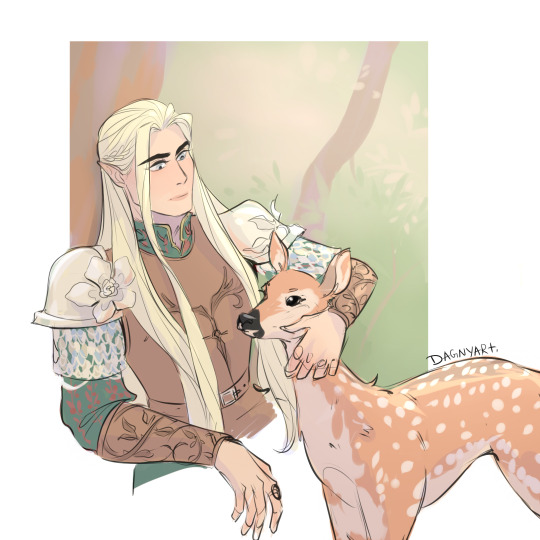
I made a redesign for Thranduil. I wanted to add something vimpireish in his look, I think it can work good for his gloomy forest kindom! Also I wanted to keep forest and floral parts, because these folks are very close to nature. You can find my early fanart with him in my blog and many other silmarillion and lotr arts. Also commissions are open
#thranduil#elronduil#silmarillion#the hobbit#lotr art#the silmarillion#silm art#sindar#silm#mirkwood#lore elves
766 notes
·
View notes
Text
so you know how in the movies legolas says “a balrog of morgoth?”
well “morgoth” is fëanorian quenya, coined by fëanor himself. (in most texts i think? the proper sindarin version of this would be bauglir).
so either a, legs wanted to sound smart and used the archaic old stabby boy version, orrrrrr b, he learnt it from elrond. and then wanted to sound smart and used the stabby boy version.
edit: this is actually wrong! someone smarter than me explains it here
#or c#the scriptwriters knew barely anyone was going to recognize it in the first place and decided to pencil in something more general#so that a fraction of the audience can understand the lore without having to pause midway and consult the silmarillion#but that isn’t funny sooooooo……..#tolkien#silm#lotr#quenya#sindarin#legolas#morgoth#the word not the ainu
116 notes
·
View notes
Note
Hi! Can you explain what really the power of foresight was with Faramir? I read the books earlier this year and I don't really quite understand it. He could predict the future? Like he would see it in his dreams? But how did he found out from Gollum that he was taking frodo and sam to cirith ungol and that he had committed murder before?
No problem, it's one of my favorite topics!
The concise explanation: I think Faramir's foresight/aftersight in terms of visions is a largely separate "power" from his ability to bring his strength of mind and will to bear on other people and animals, and to resist outside influence. The visions seem more a matter of broad sensitivity, something Faramir doesn't appear to have much if any control over. The second power is (in our terms) essentially a form of direct telepathy, limited in some ways but still very powerful, and I think this second ability is what Faramir is using with Gollum.
The really long version:
In my opinion, Faramir (or Denethor, Aragorn, etc) doesn't necessarily read thoughts like a book, particularly not with a mind as resistant as Gollum's. Faramir describes Gollum's mind in particular as dark and closed, it seems unusually so—
"There are locked doors and closed windows in your mind, and dark rooms behind them," said Faramir.
Still, Gollum is unable to entirely block Faramir's abilities. In LOTR, it does not seem that Gollum can fully block powerful mental abilities such as Faramir's, though his toughness and hostility does limit what Faramir can see. (Unfinished Tales, incidentally, suggests iirc that Denethor's combination of "great mental powers" and his right to use the Anor-stone allowed him to telepathically get the better of Saruman through their palantíri, a similar but greater feat.) I imagine that this is roughly similar to, but scaled down from, Galadriel's telepathic inquiries of even someone as reluctant to have her in his mind as Boromir, given that Faramir is able to still see some things in Gollum's mind, if with more difficulty than usual.
(WRT Boromir ... ngl, if I was the human buffer between Denethor and Faramir, I would also not be thrilled about sudden telepathic intrusions from basically anyone, much less someone I had little reason to trust.)
Disclaimer: a few years after LOTR's publication, Tolkien tried to systematize how this vague mystical telepathy stuff really works. One idea he had among many, iirc, was that no unwilling person's mind could be "read" the ways that Gollum's is throughout LOTR. IMO that can't really be reconciled w/ numerous significant interactions in LOTR where resistance to mental intrusion or domination is clearly variable between individuals and affected by personal qualities like strength of will, basic resilience, the effort put into opposition, supernatural powers, etc. And these attempts at resistance are unsuccessful or only partially successful on many occasions in LOTR (the Mouth of Sauron, for one example, is a Númenórean sorcerer in the book who can't really contend with Aragorn on a telepathic level). So I, personally, tend to avoid using the terminology and rationales from that later systematized explanation when discussing LOTR. And in general, I think Tolkien's later attempts to convert the mystical, mysterious wonder of Middle-earth into something more "hard magic" or even scientific was a failed idea on a par with Teleporno. Others differ!
In any case, when Gollum "unwillingly" looks at Faramir while being questioned, the creepy light drains from his eyes and he shrinks back while Faramir concludes he's being honest on that specific occasion. Gollum experiences physical pain when he does try to lie to Faramir—
"It is called Cirith Ungol." Gollum hissed sharply and began muttering to himself. "Is not that its name?" said Faramir turning to him. "No!" said Gollum, and then he squealed, as if something had stabbed him.
I don't think this is a deliberate punishment from Faramir—that wouldn't be like him at all—and I don't think it's the Ring, but simply a natural consequence of what Faramir is. Later, Gandalf says of Faramir's father:
"He can perceive, if he bends his will thither, much of what is passing in the minds of men ... It is difficult to deceive him, and dangerous to try."
So, IMO, Faramir's quick realization that Gollum is a murderer doesn't come from any vision of the future or past involving Gollum—that is, it's not a deduction from some event he's seen. Faramir does not literally foresee Gollum's trick at Cirith Ungol. His warning would be more specific in that case, I think. What he sees seems to be less detailed but more direct and, well, mystical. Faramir likely doesn't know who exactly Gollum murdered or why or what any of the circumstances were. Rather, Gollum's murderousness and malice are visible conditions of his soul to Faramir's sight. Faramir doesn't foresee the particulars of Gollum's betrayal—but he can see in Gollum's mind that he is keeping something back. Faramir says of Gollum:
"I do not think you are holden to go to Cirith Ungol, of which he has told you less than he knows. That much I perceived clearly in his mind."
Meanwhile, in a letter written shortly before the publication of LOTR, Tolkien said of Faramir's ancestors:
They became thus in appearance, and even in powers of mind, hardly distinguishable from the Elves
So these abilities aren't that strange in that context. Faramir by chance (or "chance") is, like his father, almost purely an ancient Númenórean type despite living millennia after the destruction of Númenor (that destruction is the main reason "Númenóreanness" is fading throughout the age Faramir lives in). Even less ultra-Númenórean members of Denethor's family are still consistently inheriting characteristics from their distant ancestor Elros, Elrond's brother, while Faramir and Denethor independently strike Sam and Pippin as peculiarly akin to Gandalf, a literal Maia like their ancestress Melian:
“Ah well, sir,” said Sam, “you [Faramir] said my master had an elvish air; and that was good and true. But I can say this: you have an air too, sir, that reminds me of, of—well, Gandalf, of wizards.”
He [Denethor] turned his dark eyes on Gandalf, and now Pippin saw a likeness between the two, and he felt the strain between them, almost as if he saw a line of smouldering fire drawn from eye to eye, that might suddenly burst into flame.
Meanwhile, Faramir's mother's family is believed to be part Elvish, a belief immediately confirmed when Legolas meets Faramir's maternal uncle:
At length they came to the Prince Imrahil, and Legolas looked at him and bowed low; for he saw that here indeed was one who had elven-blood in his veins. "Hail, lord!" he [Legolas] said. "It is long since the people of Nimrodel left the woodlands of Lórien, and yet still one may see that not all sailed from Amroth’s haven west over water."
In addition to that, Faramir's men believe he's under some specific personal blessing or charm as well as the Númenórean/Elvish/Maia throwback qualities. It's also mentioned by different groups of soldiers that Faramir can exercise some power of command over animals as well as people. Beregond describes Faramir getting his horse to run towards five Nazgûl in real time:
"They will make the Gate. No! the horses are running mad. Look! the men are thrown; they are running on foot. No, one is still up, but he rides back to the others. That will be the Captain [Faramir]: he can master both beasts and men."
Then, during the later retreat of Faramir's men across the Pelennor:
At last, less than a mile from the City, a more ordered mass of men came into view, marching not running, still holding together. The watchers held their breath. "Faramir must be there," they said. "He can govern man and beast."
Tolkien said of the ancient Númenóreans:
But nearly all women could ride horses, treating them honourably, and housing them more nobly than any other of their domestic animals. The stables of a great man were often as large and as fair to look upon as his own house. Both men and women rode horses for pleasure … and in ceremony of state both men and women of rank, even queens, would ride, on horseback amid their escorts or retinues … The Númenóreans trained their horses to hear and understand calls (by voice or whistling) from great distances; and also, where there was great love between men or women and their favorite steeds, they could (or so it is said in ancient tales) summon them at need by their thought alone. So it was also with their dogs.
Likely the same Númenórean abilities were used for evil by Queen Berúthiel against her cats. In an interview with Daphne Castell, Tolkien said:
She [Berúthiel] was one of these people who loathe cats, but cats will jump on them and follow them about—you know how sometimes they pursue people who hate them? I have a friend like that. I’m afraid she took to torturing them for amusement, but she kept some and used them—trained them to go on evil errands by night, to spy on her enemies or terrify them.
The more formal version of the Berúthiel lore recurs in Unfinished Tales:
She had nine black cats and one white, her slaves, with whom she conversed, or read their memories, setting them to discover all the dark secrets of Gondor, so that she knew those things "that men wish most to keep hidden," setting the white cat to spy upon the black, and tormenting them.
Faramir, by contrast, has a strong aversion to harming/killing animals for any reason other than genuine need, but apparently quite similar basic abilities. He typically uses these abilities to try to compassionately understand other people or gather necessary information, rather than for domination or provoking fear. Even so, Faramir does seem to use his mental powers pretty much all the time with no attempt to conceal what he's doing—he says some pretty outlandish things to Frodo and Sam as if they're very ordinary, but it doesn't seem that most people he knows can do all these things. This stuff is ordinary to him because it flows out of his fundamental being, not because it's common.
It's not clear how much fine control he has, interestingly. This is more headcanon perhaps, but I don't feel like it's completely under his control, even while it's much more controlled than things like Faramir's vision of Boromir's funeral boat, his frequent, repeated dreams of Númenor's destruction, the Ring riddle dream he received multiple times, or even his suspiciously specific "guess" of what passed between Galadriel and Boromir in Lothlórien. Yet his more everyday mental powers do seem to involve some measure of deliberate effort in a lot of the instances we see, given the differing degrees of difficulty and strain we see with the powers he and Denethor exhibit more frequently and consistently.
This is is also interesting wrt Éowyn, because Tolkien describes Faramir's perception of her as "clear sight" (which I suspect is just Tolkien's preferred parlance for "clairvoyance"). Faramir perceives a lot more of what's going on with Éowyn than I think he had materially observable evidence for—but does not see everything that's going on with her by any means. He seems to understand basically everything about her feelings for Aragorn, more than Éowyn herself does, but does not know if she loves him [Faramir].
I'm guessing that it's more difficult to "see" this way when it's directly personal (one of the tragedies of his and Denethor's relationship is that their shared mental powers do not enable either to realize how much they love each other). But it also doesn't seem like he's trying to overcome Éowyn's mental resistance the way he was with Gollum, and possibly Frodo and Sam—he does handle it a bit differently when it's not a matter of critical military urgency. With Éowyn, he sees what his abilities make clear to him, is interested enough to seek out Merry (and also perceive more than Merry says, because Faramir has never been a normal person one day in his life) but doesn't seem to really push either of them.
So I tend to imagine that with someone like Faramir, Denethor, Aragorn etc, we're usually seeing a relatively passive, natural form of low-grade telepathy that simply derives from their fundamental nature and personalities (as we see in Faramir with Éowyn, possibly Faramir with Aragorn). That can be kicked up to more powerful, forceful telepathy via active exertion of the will (as described by Gandalf wrt Denethor's ability to "bend[] his will thither" to see what passes in others' minds, and seen with Faramir vs Gollum, Aragorn vs the Mouth of Sauron, more subtly Faramir vs Denethor). At a high point of strain this can be done very aggressively or defensively (Denethor vs Gandalf, Denethor vs Saruman, Denethor vs Sauron seriously is there a Maia that man won't fight, Faramir vs the Black Breath given his completely unique symptoms that Aragorn attributes to his "staunch will", possibly Aragorn vs the Black Breath in a healing capacity...).
Anyway, I hope these massive walls of text are helpful or interesting! Thanks for the ask :)
#honestly hilarious that first age men straight-up lie to the fëanorians and nobody has any idea#gollum says a one-word falsehood to faramir and starts screaming. some people are just made different i guess#(more seriously i think these abilities are so different between lotr and the silm because of narrative structure and functions#faramir and denethor aren't insignificant but are placed in such a way that their abilities support lotr's structural integrity#rather than breaking the logic of the story the way really-good-at-telepathy fëanorians would#...hence the awkwardness of finding something for galadriel and celeborn to be doing lmao. the real problem children of tolkien lore!#aragorn /is/ central enough to cause problems but his abilities are less specifically focused on telepathy so it works#i bet random citizens of pelargir felt that berúthiel's very faramir-ish abilities were absolutely OP though#...justice for gondorian cats honestly. i know tolkien was weird about feline life but i choose to believe faramir is a friend to cats)#anghraine babbles#legendarium blogging#legendarium fanwank#anon replies#respuestas#faramir#jewel of the seashore#húrinionath#denethor#sméagol#lord of the rings#jrr tolkien#anghraine's meta#long post#the letters of jrr tolkien#nature of middle earth#berúthiel#anghraine's headcanons#éowyn
135 notes
·
View notes
Text

Fëanor had fled into the night distraught: for his father was dearer to him than the Light of Valinor and the peerless works of his hands.
After him, Maedros and his brethren went in haste, dismayed, for they had not known he was present when Maedros delivered the news. Now they feared that Fëanor may slay himself. All those who saw Fëanor's anguish grieved for him and forgave all his bitterness.
Finwë had been slain at the doors of Formenos. Where all had fled, he had stood alone, defiant. The sons of Fëanor had found him; his head had been crushed with a great mace of iron. His sword had laid beside him, twisted and untempered as if struck by lightning. Formenos was broken and ravaged.
Fëanor, upon hearing the news, fell upon his face and lay as one dead.
Morgoth's presence in Valinor had brought corruption. Finwë's body, as his spirit headed for the Halls of Mandos and the embrace of his beloved, desintegrated quickly, leaving nothing behind.
Source: Morgoth's Ring, "Part Three. The Later Quenta Silmarillion
#fëanor#fëanorians#tolkien#drawing#illustration#art#procreate#digital art#inspiration#fantasy art#silmarillion#silm art#lotr fanart#fanart#morgoth#house of finwë#finwë#elves#lore#illustrating on tumblr#draw everyday#night
30 notes
·
View notes
Text
Elves awoke before the sun and therefore have good night vision. The simple answer is they, as many animals do, possess tapeta lucidum. This is what makes makes your pet’s pupils flash red when they catch the light.
Elves do that too.
(How does this relate to tree-light eyes? One explanation is that the tapetum’s shine was mistaken for the shine of tree light by less cultured individuals, but in keeping with canon we might suggest a sort of permanent super-saturation, which makes no sense but is probably theoretically possible.)
82 notes
·
View notes